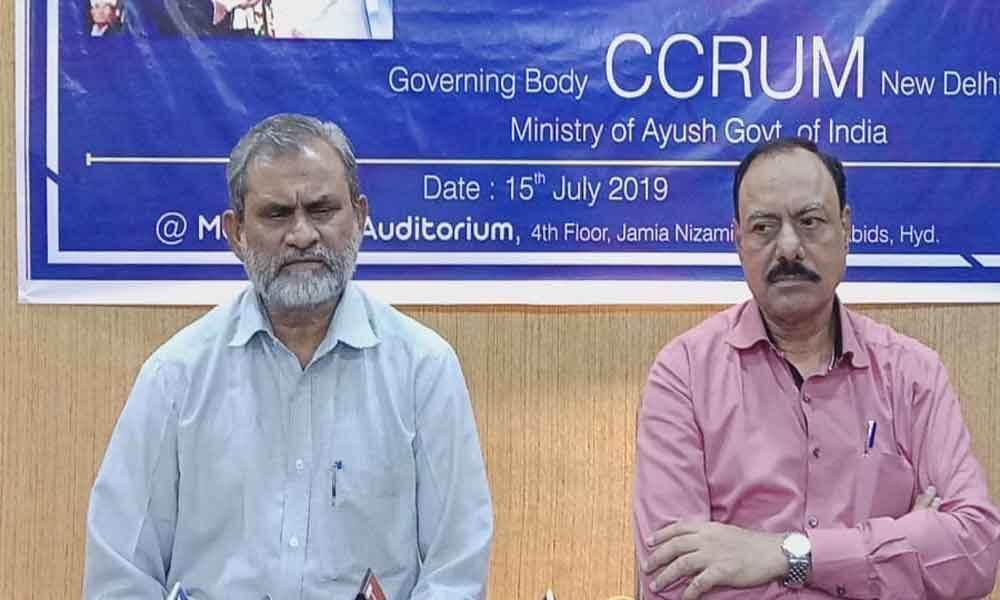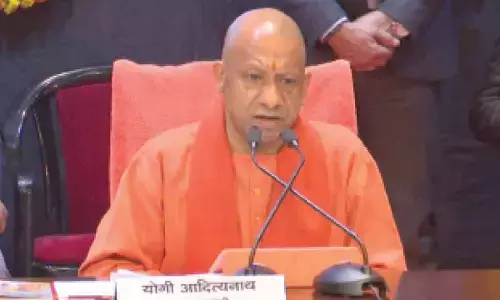Vitiligo spreading fast, create awareness: Doctors

During daily day routine, including food habits, the choice of cosmetics and use of plastics can influence onset of Vitiligo disease which causes loss of skin color in blotches.
Abids : During daily day routine, including food habits, the choice of cosmetics and use of plastics can influence onset of Vitiligo disease which causes loss of skin color in blotches.
Certain food articles like sea food when consumed along with milk products, excessive consumption of broiler chicken and eggs and pickles may aggravate the disease, cautions newly nominated vice-president (technical) of Central Council for Research in Unani Medicine (CCRUM). Vitiligo is a disease in which the pigment cells of the skin, melanocytes, are destroyed in certain areas.
Symptoms and signs of vitiligo include loss of skin color in the form of depigmented, or white, patches of skin in any location on the body. The patches appear when melanocytes within the skin die off. Melanocytes are the cells responsible for producing the skin pigment, melanin, which gives skin its color and protects it from the sun's UV rays.
Launching an awareness campaign to usher in a Vitiligo-free society here on Monday, Padmashri Dr MA Waheed said Vitiligo remains the one that invokes social stigma. He said that Vitiligo is a stubborn disease and the best way to counter it is to prevent it from spreading by spreading awareness about in the society.
Many people do not understand the aftermaths of the disease. "The condition affects an individual psychologically as the changing pigmentation of the visible skin causes social stigma. Many patients have lost their jobs and to some it cost workplace opportunities, which affect not just the individual but his family members as a whole," he noted.
1.2 % affected in city
Dr MA Waheed stressed awareness was required to stop the disease from spreading, and held that nearly 1.2% of the population in Hyderabad was affected by Vitiligo while the global average was 0.5 to 1 per cent.
Dr Waheed, who was presented with the Padma Shri Award in 2017 for breakthrough research in Vitiligo in Unani medicine, urged the people to maintain a balanced diet consisting of mutton, organic chicken, vegetables, chapatti, rice, sprouts, and non-citrus fruits. He explained that Vitiligo too has genetic predisposition, but not among all. Vitiligo is non-contagious. Relatives of nearly 13% per cent patients have inherited the disease, while 87% have not. However, mode of inheritance is not fully understood and is attributed to multiple factors.
Patients with auto-immune disorders like diabetes, thyroid (most commonly hypothyroidism), psoriasis, pernicious anemia, Halonevi, Addison's disease, alopecia areata and atopic dermatitis, scleroderma and hyper parathyriodism among others are more likely to be affected.
Chemical-contact Vitiligo emerging fastest
Dr Waheed said, "the most common and fastest emerging type of Vitiligo is Chemical Contact Vitiligo which is caused due to chemical contact (drugs/chemicals: hydroquinone, Phenolic compounds, detergents, antiseptics, adhesives), use of recycled plastic wear, poor-quality cosmetics (commonly bindis, lipstick), use of condoms are a few to start with.
Vitiligo is a patchy loss of color of the skin, is an acquired depigmentation of skin which results from the destruction of the melanocytes. Globally, Vitiligo affects 0.5-1% of the population. The incidence of Vitiligo is around 1 per cent of the total population in USA, 1.64 percent in Japan, 0.14 per cent in USSR, 0.24 per cent in London, 0.39 per cent in Switzerland and 1 per cent in Egypt.
In India, it is estimated to be 0.4% to 2.5%. Gujarat and Rajasthan states have the highest prevalence in terms of seeking treatment however disease prevails more in coastal areas of Kerala, Tamil Nadu, Andhra Pradesh, West Bengal and Gujarat.
According to the various studies in different cities of India can be anything between 2.9% in Goa to 8.8 percent in Delhi and 1.2% in Hyderabad. "However, most authors say that its incidence is around 4% which is definitely more as compared to the world's population of 1 percent," he added.
Dr Munawwar Hussain Kazmi, Deputy Director CRIUM, In-charge (Hyderabad) was also present. Dr MA Waheed has also served as the Officiating Director of CCRUM before being nominated for the post of Vice President (Technical) on Friday.
FAST FACTS ON VITILIGO
• Vitiligo can affect people of any age, gender, or ethnicity.
• The exact cause is unknown, but it may be due to an autoimmune disorder or a virus.
• Treatment options may include exposure to UVA or UVB light and depigmentation of the skin in severe cases
• Vitiligo is non-contagious. Relatives of only 13% patients have inherited the disease
• The mode of inheritance is not fully understood and is attributed to multiple factors
WHO ARE MOST VULNERABLE?
Patients with auto-immune disorders like diabetes, thyroid (most commonly hypothyroidism), psoriasis, pernicious anemia, Halonevi, Addison's disease, alopecia areata and atopic dermatitis, scleroderma and hyper parathyriodism among others are more likely to be affected
WHAT DOCS ADVISE?
Maintain a balanced diet consisting of mutton, organic chicken, vegetables, chapatti, rice, sprouts, and non-citrus fruits










